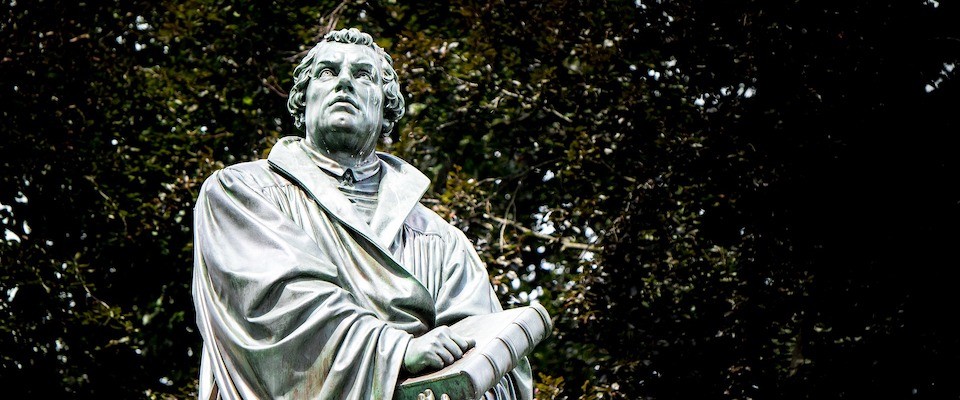By Archbishop Charles J. Chaput, First Things, 10 . 12 . 17
Later this month, Western Christians will celebrate or grieve, or some mix of both, an awkwardly shared anniversary: the nailing of Martin Luther’s Ninety-Five Theses to the door of a Wittenberg church in 1517.
Never mind that the nailed-to-the-door story probably never happened. Never mind that Luther’s heroic words to an Imperial Diet at Worms—“Here I stand; I can do no other”—probably weren’t said. And never mind that the Reformed Churches of Huldrych Zwingli and John Calvin may have had more success in spreading Protestant Christianity than Luther ever did. Five hundred years later, Martin Luther, liberator or heresiarch, is the man who set the Reformation era in motion. His memory still looms over the modern world he unwittingly helped create.
His genius was obvious. So were his many flaws. The greatest of the hymns he authored—“A Mighty Fortress Is Our God”—is electrifying in its beauty and grandeur; its recording in German by the Leipzig Capella Fidicinia decades ago has the power to transport the soul. Luther’s intellect, energy, courage, and zeal for the Gospel were immense. So was his ego. So was his wrath. Reading his 1520 essay “The Babylonian Captivity of the Church” is a lesson in brilliant (and bitterly ruthless) polemic—a blitzkrieg of biblical exegesis and ferocious contempt targeting his scholarly critics, corrupt clergy, Aristotle, a “tyrannous” papacy, and the whole architecture of Catholic sacramental theology and practice.
History tells the rest of the story. The fractures in Western Christianity opened by the various Protestant and Catholic Reformations—“the Reformation” was more accurately a series of parallel and competing reform efforts—led to 150 years of fierce religious conflict and the birth of new and drastically different attitudes toward the roles of religion and state.
Five centuries after Luther, we in the “developed” nations live in a world that incarnates the revenge of unintended consequences. As Brad Gregory writes in his absorbing new biography of Luther and his times, Rebel in the Ranks, the German monk and his fellow Reformers had no interest in modern notions of democracy, individual autonomy and freedom. Quite the opposite:
Luther would deride the idea of freedom as we know it today and disclaim any credit for it. In fact, he would be disgusted by it, because it has nothing to do with what he regarded as the only real freedom, the bound freedom of a Christian. . . . [All of the Reformers, including Luther,] would be appalled if they could see how their actions led indirectly to a profound diminishing of Christianity’s public influence in Western societies . . . [and to popular cultures] where the consumption of goods and pursuit of enjoyment has essentially replaced religion.
All true. And yet, here we sit by the rivers of New Babylon, believing Catholics and Protestants alike, paradoxically linked in a love for Jesus Christ, but wrapped in a hundred new forms of entangling captivity—sex, food, money, drugs, ambition, technology, noise, more sex, anxiety, distrust, loneliness, the politics of victimhood and resentment, feelings posing as truth, emotion posing as reason, moral indifference and cowardice posing as compassion, imaginations strip-mined of the sacramental and supernatural, and then colonized with the relentless teasing of material appetites. A place where the horizons of the eternal disappear into a fog of the urgent now. A mighty fortress is our gaud.
Or to put it another way: great mission territory.
Twenty years ago a priest friend said—he had served in Rome, with all the good and sometimes not-so-good experience that implies—that even in a world paved in cement, life forces its way through the cracks. So it is with the Gospel. So it is with hearts alive in Jesus Christ. And so it needs to be, five hundred years after Luther, with the witness each of us as Christians offers to the world. The greatest captivity of Babylon, whatever name it goes by in any age, has little to do with persecution or repression. It’s the lie that nothing deeper, nothing greater, nothing more beautiful and satisfying and permanent than itself, exists.
We were made for more, and that “more” is this. Only Jesus Christ is Lord—and in that truth, despite every sin we’ve committed against each other over so many generations, is our unity as Christians, our joy, our salvation, and the only enduring hope for the world.




